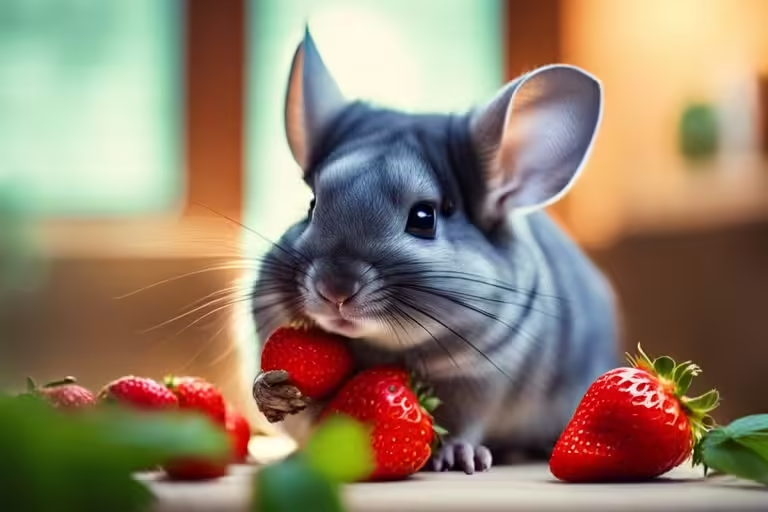If you’re a chinchilla owner, you’re probably wondering what fruits are safe for your furry friend to snack on. Strawberries are a delicious and nutritious treat for humans, but can your chinchilla enjoy them too? The answer is not a simple yes or no. While strawberries aren’t toxic to chinchillas, they do pose some risks. In this post, we’ll investigate the details of why strawberries should be given in moderation, and what precautions you need to take to ensure your chinchilla stays healthy and happy.
Key Takeaways:
- Freshness Matters: In the matter of feeding strawberries to chinchillas, freshness is crucial. Only provide fresh, ripe strawberries to your pet, as unripe or rotten strawberries can cause digestive issues.
- Modulation is Key: Strawberries should be treated as an occasional snack for chinchillas, not a staple in their diet. Limit the amount of strawberries you feed your pet to avoid overloading them with sugar and causing health problems.
- Watch for Signs of Distress: Monitor your chinchilla’s behavior and health closely after introducing strawberries into their diet. If you notice any signs of distress, such as diarrhea, lethargy, or loss of appetite, stop feeding them strawberries immediately.
Nutritional Value of Strawberries
For those who love strawberries, it’s vital to understand their nutritional value to determine if they’re a good fit for your chinchilla’s diet.
Vitamin Content
Among other vitamins, strawberries are an excellent source of vitamin C, potassium, and folate. These vitamins play a crucial role in maintaining your chinchilla’s overall health, from boosting their immune system to supporting their heart health.
Sugar and Fiber Content
Value-wise, strawberries are relatively low in calories but high in natural sugars and fiber. One cup of strawberries contains about 7 grams of sugar and 3 grams of fiber.
Plus, the natural sugars in strawberries come with a warning: they can be detrimental to your chinchilla’s health if consumed excessively. Chinchillas have sensitive digestive systems, and too much sugar can lead to digestive issues and obesity. On the other hand, the fiber content in strawberries can help support your chinchilla’s digestive health, but only in moderation. It’s vital to balance the benefits of fiber with the risks of sugar overload.
Chinchilla Dietary Needs
Some of the most important things to consider when it comes to your chinchilla’s diet are their specific nutritional needs. Chinchillas have unique requirements that are crucial to their overall health and well-being.
High-Fiber Requirements
To keep your chinchilla’s digestive system running smoothly, they need a diet rich in fiber. A high-fiber diet helps prevent health issues like constipation and diarrhea, which can be common problems in chinchillas. Hay, such as timothy hay or alfalfa hay, should make up the bulk of your chinchilla’s diet to ensure they’re getting enough fiber.
Limited Sugar Intake
For your chinchilla’s health, it’s vital to limit their sugar intake. Sugary foods can lead to obesity, diabetes, and other serious health problems in chinchillas. You should avoid giving your chinchilla foods high in sugar, such as dried fruits, candy, and sweet treats.
Chinchilla owners often underestimate the importance of limiting sugar in their pet’s diet. Foods high in sugar can be addictive to chinchillas, leading them to overeat and develop unhealthy eating habits. By keeping sugary foods to a minimum, you can help your chinchilla maintain a healthy weight and reduce the risk of diet-related health issues.

Can Chinchillas Eat Strawberries?
After researching and consulting with veterinarians, the answer is yes, chinchillas can eat strawberries! However, it’s crucial to understand the potential health risks and safe consumption guidelines to ensure your furry friend enjoys this sweet treat without any harm.
Potential Health Risks
Risks associated with feeding strawberries to chinchillas include digestive issues, such as diarrhea or stomach upset, due to the high sugar and water content. Make sure to introduce strawberries gradually and in small amounts to prevent any adverse reactions.
Safe Consumption Guidelines
Potentially, strawberries can be a healthy addition to your chinchilla’s diet if consumed in moderation. Limit strawberry servings to 1-2 teaspoons per pound of body weight per day.
This means if your chinchilla weighs 2 pounds, you can offer 2-4 teaspoons of strawberries daily. It’s also crucial to choose fresh, organic strawberries and remove any stems, leaves, or seeds, which can be toxic to your pet. Always wash the strawberries thoroughly before serving to ensure your chinchilla’s safety. Keep in mind, strawberries should not replace your chinchilla’s regular diet but rather serve as an occasional treat.
Final Words
Presently, you’ve made it to the end of our journey exploring the sweet and juicy world of strawberries and chinchillas! You now know that, yes, chinchillas can eat strawberries, but in moderation and as an occasional treat. Remember to always prioritize your furry friend’s health by providing a balanced diet and consulting with a vet if you’re unsure. By doing so, you’ll ensure your chinchilla lives a happy, healthy, and strawberry-filled life!
FAQ
Q: Can chinchillas eat strawberries as a regular part of their diet?
A: No, strawberries should not be a regular part of a chinchilla’s diet. While strawberries are not toxic to chinchillas, they are high in sugar and water content, which can cause digestive issues and lead to health problems if fed excessively.
Q: Are there any specific risks associated with feeding strawberries to chinchillas?
A: Yes, there are several risks associated with feeding strawberries to chinchillas. The high sugar content in strawberries can cause a rapid increase in blood sugar levels, leading to conditions like diabetes and obesity. .
Q: Can I give my chinchilla strawberries as an occasional treat?
A: Yes, strawberries can be given as an occasional treat in moderation, but with caution. Remove the seeds and leaves, and only offer a small amount (about 1-2 slices) as an occasional treat, no more than 1-2 times a week.
